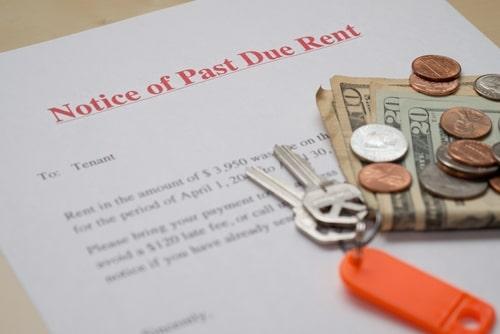1512 Artaius Parkway, Suite 300,
Libertyville, IL 60048
Call for a FREE Phone Consultation
847-549-0000
Video Consultations Also Available
Serving Clients Across 7 Illinois Locations
Recent Blog Posts
What Options Do Landlords Have After the End of the Eviction Moratorium?
 Many families have been affected by the COVID-19 pandemic, and those who have experienced financial difficulties may have struggled to pay ongoing expenses, including rent. To help protect families from losing their homes and being put at risk of infections, the federal government placed a moratorium on evictions, and multiple state governments did the same. A recent Supreme Court decision ended the federal eviction moratorium, but Illinois’ moratorium is still in effect, and Governor J.B. Pritzker has stated that it will be extended through October 3, 2021. Landlords with tenants who have been unable to pay rent will need to understand their options, including determining whether they may be able to perform evictions or use lease modifications.
Many families have been affected by the COVID-19 pandemic, and those who have experienced financial difficulties may have struggled to pay ongoing expenses, including rent. To help protect families from losing their homes and being put at risk of infections, the federal government placed a moratorium on evictions, and multiple state governments did the same. A recent Supreme Court decision ended the federal eviction moratorium, but Illinois’ moratorium is still in effect, and Governor J.B. Pritzker has stated that it will be extended through October 3, 2021. Landlords with tenants who have been unable to pay rent will need to understand their options, including determining whether they may be able to perform evictions or use lease modifications.
Availability of Emergency Rental Assistance
Tenants who have struggled to pay rent and landlords facing financial difficulties due to the inability to collect rent payments may qualify for emergency rental assistance (ERA) provided by state and local programs, including the Illinois Rental Payment Program. The Biden administration and the Treasury Department have implemented new rules meant to ensure that people who qualify for ERA can receive relief quickly. These include:
How Can the Flex Modification Program Prevent Foreclosure?
 Anyone can encounter financial problems that affect their ability to meet their obligations. Homeowners who are struggling to pay bills may be concerned about what will happen if they get behind on their mortgage payments. Those who are worried about the possibility of foreclosure will want to understand their options, and in some cases, they may qualify for mortgage relief through the Flex Modification Program.
Anyone can encounter financial problems that affect their ability to meet their obligations. Homeowners who are struggling to pay bills may be concerned about what will happen if they get behind on their mortgage payments. Those who are worried about the possibility of foreclosure will want to understand their options, and in some cases, they may qualify for mortgage relief through the Flex Modification Program.
Eligibility for the Flex Modification Program
To determine whether they qualify for the Flex Modification Program, homeowners will need to understand who owns their loan. This program is available for mortgages owned or guaranteed by the Federal National Mortgage Association (Fannie Mae) or the Federal Home Loan Mortgage Corporation (Freddie Mac). While a mortgage may have originated with a bank or another private lender, many mortgages are sold to other investors, including Fannie Mae and Freddie Mac. While these loans may then be sold to another investor, they will often be guaranteed by Fannie Mae or Freddie Mac, allowing homeowners to take advantage of relief through the Flex Modification Program.
What Are The Different Types of Deeds?
 Selling or purchasing a home can be a stressful and exciting time. There are several tasks you must remember and several documents you must sign in order to ensure that everything goes smoothly. This is why it is important to make sure that you properly execute the right documents. One such document you must have is the deed. The deed transfers the title of the property to or from you. There are four commonly seen deed categories: Quit Claim, Warranty, Special Warranty, and In Trust Deeds. When buying or selling real estate, it is important to understand the differences in each type of deed. Here is what you should know.
Selling or purchasing a home can be a stressful and exciting time. There are several tasks you must remember and several documents you must sign in order to ensure that everything goes smoothly. This is why it is important to make sure that you properly execute the right documents. One such document you must have is the deed. The deed transfers the title of the property to or from you. There are four commonly seen deed categories: Quit Claim, Warranty, Special Warranty, and In Trust Deeds. When buying or selling real estate, it is important to understand the differences in each type of deed. Here is what you should know.
Quit Claim Deeds
A Quit Claim Deed does as it sounds: it renounces one’s interest in a piece of property. The individual who acquires the property through a Quit Claim Deed does not promise that the property will be free of third-party interests, such as liens. A Quit Claim Deed also fails to provide any warranties as to the property or nuisances within the property. Put simply, with a Quit Claim Deed clear title of the property is not promised.
Foreclosure Moratorium Extended Again With Protections for Borrowers
 Many families in the United States face the threat of foreclosure due to financial difficulties related to the COVID-19 pandemic. Fortunately, most of these families have been able to avoid losing their homes thanks to the moratorium on foreclosures that was put in place in March of 2020. This moratorium has been extended several times, and while it was scheduled to expire on June 30, 2021, it has been extended once again. Homeowners may be able to make use of provisions that will allow them to maintain ownership of their homes.
Many families in the United States face the threat of foreclosure due to financial difficulties related to the COVID-19 pandemic. Fortunately, most of these families have been able to avoid losing their homes thanks to the moratorium on foreclosures that was put in place in March of 2020. This moratorium has been extended several times, and while it was scheduled to expire on June 30, 2021, it has been extended once again. Homeowners may be able to make use of provisions that will allow them to maintain ownership of their homes.
Foreclosure Relief for Federally-Backed Mortgages
The federal foreclosure moratorium has been extended through July 31, 2021. This moratorium applies to homes financed through USDA Single-Family Housing Direct and Guaranteed loans, as well as single-family mortgages backed by Fannie Mae and Freddie Mac.
How Can Mechanic’s Liens Affect a Real Estate Transaction?
 During a residential real estate transaction, all encumbrances on the title of the property will need to be resolved before the transaction can be completed. These encumbrances may include liens by creditors seeking repayment from the homeowner, such as mechanic’s liens. Those planning to sell their home will need to determine how to address any mechanic’s liens and resolve these issues to ensure that they can complete the sale successfully.
During a residential real estate transaction, all encumbrances on the title of the property will need to be resolved before the transaction can be completed. These encumbrances may include liens by creditors seeking repayment from the homeowner, such as mechanic’s liens. Those planning to sell their home will need to determine how to address any mechanic’s liens and resolve these issues to ensure that they can complete the sale successfully.
What Is a Mechanic’s Lien?
A mechanic’s lien allows a contractor or supplier who performed repairs or made improvements to a home to collect payment for any unpaid work. While homeowners will usually be able to resolve any payment issues with a general contractor, subcontractors or suppliers who were not paid by the primary contractor may also use mechanic’s liens to collect the payments they are owed.
Mistakes to Avoid When Preparing to Buy a Home
 For many people and families, homeownership is an important goal. Owning your own home not only ensures that you and your family will have a place to live and call your own, but it is also a good investment that can provide you with a number of financial benefits. However, if you are planning to buy a home, you will want to be aware of some mistakes that could affect your ability to obtain a mortgage or make a good offer on a property. These include:
For many people and families, homeownership is an important goal. Owning your own home not only ensures that you and your family will have a place to live and call your own, but it is also a good investment that can provide you with a number of financial benefits. However, if you are planning to buy a home, you will want to be aware of some mistakes that could affect your ability to obtain a mortgage or make a good offer on a property. These include:
- Failing to get preapproval for a mortgage - The first step to buying a home often involves understanding what you can afford. By looking at your income and expenses, you can determine an amount that you will be able to put toward a mortgage each month. With this information, you then work with a bank or other mortgage lender to get preapproval for a loan of a certain amount. With this preapproval, you will be able to make an offer once you have found the home you want to buy, and this will show a seller that you will be able to pay the amount offered.
Can I Avoid Foreclosure by Refinancing My Home?
 There are many reasons why a family may struggle financially, especially since the onset of the COVID-19 pandemic in 2020. If you are having difficulty making mortgage payments, and you do not expect this to change in the near future, you will likely worry about your ability to keep your home. If you default on your mortgage by missing one or more payments, your lender may begin the foreclosure process. Fortunately, you have options, including seeking a new loan to refinance your home. It is best to take action as soon as possible, because once your lender initiates foreclosure proceedings, addressing these issues will become more complicated and costly.
There are many reasons why a family may struggle financially, especially since the onset of the COVID-19 pandemic in 2020. If you are having difficulty making mortgage payments, and you do not expect this to change in the near future, you will likely worry about your ability to keep your home. If you default on your mortgage by missing one or more payments, your lender may begin the foreclosure process. Fortunately, you have options, including seeking a new loan to refinance your home. It is best to take action as soon as possible, because once your lender initiates foreclosure proceedings, addressing these issues will become more complicated and costly.
Options for Refinancing
Refinancing differs from other types of loan modifications. When you refinance your home, you will be obtaining a loan that will pay off the balance on your current mortgage. Since this is a completely new loan, you will be required to pay closing costs and fees, and you will need to show that you have a steady income. You will most likely also need to own some equity in your home.
Do I Need to Perform a Pest Inspection When Selling My Home?
 There are many things that need to be considered when selling a home. Sellers will want to make sure all known defects have been repaired, and they may want to make improvements that are likely to increase the home’s value. They will also want to make sure their home is clean and well-organized to present a positive image to prospective buyers. However, there is one issue that sellers should also be aware of that is often overlooked: pests in the home. Understanding how to determine whether pests are present and what should be done to deal with them can help sellers avoid additional expenses and complications during the home closing process.
There are many things that need to be considered when selling a home. Sellers will want to make sure all known defects have been repaired, and they may want to make improvements that are likely to increase the home’s value. They will also want to make sure their home is clean and well-organized to present a positive image to prospective buyers. However, there is one issue that sellers should also be aware of that is often overlooked: pests in the home. Understanding how to determine whether pests are present and what should be done to deal with them can help sellers avoid additional expenses and complications during the home closing process.
Pest Inspection Requirements
While sellers are not required to perform pest inspections prior to listing their home or accepting an offer, lenders will often require buyers to get a pest inspection to identify any concerns about termites, carpenter ants, or other issues that could affect the structural integrity of the home. If these types of pests are discovered after an offer has been accepted, the buyer may ask the seller to pay for treatment and repairs, or the buyer may even back out of the sale. To avoid these types of issues, sellers may want to perform a pest inspection before listing the home, and if pests are discovered, they can determine the best way to address this issue.
What You Need to Know About Flooding When Buying a Home
 If you are planning to buy a home, you will need to consider a wide variety of issues that may affect your transaction. While you may be focused on obtaining financing and meeting all of your requirements before your home closing date, you should also take the time to determine whether there are any issues with your new home that you may need to consider. The potential for flooding is one issue that is often overlooked. By understanding your risks and the options available to you, you can take steps to prevent financial losses in the future.
If you are planning to buy a home, you will need to consider a wide variety of issues that may affect your transaction. While you may be focused on obtaining financing and meeting all of your requirements before your home closing date, you should also take the time to determine whether there are any issues with your new home that you may need to consider. The potential for flooding is one issue that is often overlooked. By understanding your risks and the options available to you, you can take steps to prevent financial losses in the future.
Understanding Flooding Risks and Flood Insurance
Determining whether a home is at risk for flooding is not always an easy task. Some homes are located in high-risk flood zones identified by the Federal Emergency Management Agency (FEMA), but these zones are not always kept up to date. Even if a home is not located in a flood plain, flooding can still occur due to heavy rain or other weather conditions. Other issues unrelated to weather, such as clogged storm drains, water diverted by construction, or a broken or malfunctioning sump pump can also lead to flooding that may cause damage to a home.
CFPB Proposes Extending Foreclosure Moratorium Until 2022
 The COVID-19 pandemic has caused financial difficulty for many families throughout the United States. Many businesses have been forced to close or scale back their operations, resulting in widespread job losses or reductions in work hours. Many people who are struggling to pay their regular expenses have defaulted on their mortgage payments, putting them at risk of losing their homes. Fortunately, federal and state governments have placed a moratorium on foreclosures, ensuring that families will not be forced out of their homes in addition to the other difficulties they are facing. While the current foreclosure moratorium lasts through June 30, 2021, the Consumer Financial Protection Bureau (CFPB) has proposed an extension of the moratorium through the end of the year.
The COVID-19 pandemic has caused financial difficulty for many families throughout the United States. Many businesses have been forced to close or scale back their operations, resulting in widespread job losses or reductions in work hours. Many people who are struggling to pay their regular expenses have defaulted on their mortgage payments, putting them at risk of losing their homes. Fortunately, federal and state governments have placed a moratorium on foreclosures, ensuring that families will not be forced out of their homes in addition to the other difficulties they are facing. While the current foreclosure moratorium lasts through June 30, 2021, the Consumer Financial Protection Bureau (CFPB) has proposed an extension of the moratorium through the end of the year.
Details of the CFPB’s Proposal
Based on an analysis of data by the CFPB, around three million homeowners in the United States are behind on their mortgage payments. While the foreclosure moratorium has allowed many of these homeowners to receive forbearance on mortgage payments, the CFPB estimates that this forbearance period will end for around 1.7 million homeowners in September of 2021. This could result in a massive wave of foreclosures that could cause millions of families to be displaced from their homes.
 Stop Foreclosure
Stop Foreclosure
















